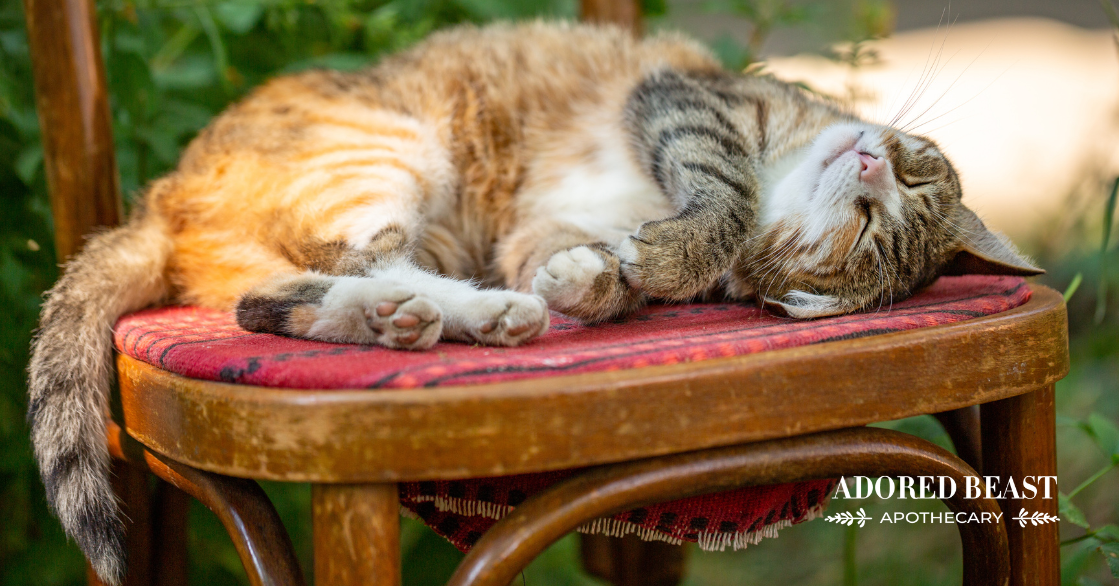We often speak about allergies in dogs, but in doing so we do our feline friends a great disservice. Allergies in cats are nearly as common as they are in people. Whether they’re related to what your cat eats or things in their environment, allergies can trigger reactions that affect cats’ airways, eyes, skin, and gastrointestinal tracts.
And springtime can be a doozy when it comes to setting things off inside your cat’s body.
We all want our cats to be comfortable, healthy, and happy. And working to reduce your cat’s allergy symptoms is a big part of that. Whether your cat is an indoor cat or spends time outside, understanding allergies is the first step in supporting your beloved beast.
What are Allergies?
In humans, dogs, and cats – any animal really – allergies are all the same. The symptoms differ, but the reaction in the body is the same.
It starts with something called histamine. This is a chemical created in the body that is released by white blood cells into the bloodstream when the immune system is defending itself. It’s part of what causes the reactive/allergic/trauma response to an allergy trigger. This release of histamine is the body’s defence against foreign proteins in the blood. The body sees an “attack”, releases mast cells that then release histamine, and this causes the body to react.
That’s why some allergy medicines are called antihistamines. They suppress that release of histamine in the body, therefore stopping or suppressing an allergic reaction. Initially, this histamine reaction is a good thing, targeting only true invaders, and the body rebounds after a short time.
The problem, however, is when the body has an overabundance of histamine, or the stimulus (the allergen) is non-stop. Then, the body can’t handle it, and allergies and their symptoms become non-stop themselves.
Cats can have allergies to certain things in their environment or be sensitive to certain foods.
Some common environmental allergens include:
- Pollen
- Grass
- Weeds
- Mold
- Dust mites (these may be more prevalent in the winter, unless you’re doing lots of spring cleaning!!)
- Leaf mold
- Scents/fragrances
- Chemicals (ex. from cleaning products)
- Certain medications
- Stress
- Flea saliva
Food allergies are the third most common type of allergies in cats. There are many types of food that a cat can be allergic to, but animal proteins such as chicken, beef, dairy, fish, and eggs are the most common culprits. Thankfully, allergic reactions to foods are fairly uncommon in cats.
These are the most common symptoms of allergies in cats:
- Scratching/itching
- Difficulty breathing
- Hair loss
- Skin irritation/redness
- Sneezing
- Coughing
- Vomiting/gagging
- Diarrhea
- Runny eyes/nose
- Chewing at paws/tail
So can you help your beloved beast when allergens are in the air?
Supporting a Cat with Allergies
Allergies often come from the gut not being in balance when your animal was young, or from being vaccinated before the age of 10 weeks or when the maternal antibodies are still active! Then they are fed commercial food and have no way of readjusting to the insult or activation from the vaccine… However, there are ways that we can help support our animals and reduce the symptoms and their severity and support the body in preventing them from continuing to create new allergies yearly.
1. Focus on Gut Health
The gut is the foundation of health, and it plays a major role in your cat’s response to allergens in their environment. If your cat’s digestive system is not functioning as it should, this can make allergy symptoms worse. In fact, if the gut is unhealthy it can be the direct cause of allergies!
The gut microbiome is made up of trillions of bacteria, viruses, and fungi. Some of that bacteria is harmful, and some of it is vital for overall health. We always want to work on overcrowding that harmful bacteria by creating an abundantly diverse, healthy gut environment. A healthy gut helps to keep unwanted allergens from entering the bloodstream.
For example, if your cat is reactive to pollen, and licks their paws, you want the gut to be able to contain that pollen and excrete it. If the gut is unhealthy, and your cat ingests that pollen, it can leak into the bloodstream, causing a major reaction, leading to a chronic allergy.
To create that healthy environment:
- give pre- and probiotics, especially species-specific with as many strains as possible
- opt for fresh, whole food whenever possible.
- avoid harsh antibiotics and drugs when you can
- reduce stress
- address leaky gut syndrome – we cannot have immune health without focusing on gut health – primary function of immune health
One of the most supportive therapies that can be to used are science-backed pre and probiotics that create immune modulation! This means they balance the immune system, rather than suppressing or increasing it. That’s important if your cat has been on antihistamines or immune suppressing drugs (the majority of allergy medication, even topical). These drugs can suppress the immune function to the point that your cat becomes susceptible to infections, causing the vet to resort to the combination use of antibiotics, which then in turn wreaks havoc on the good bacteria of the gut. This leads to the chronic allergy merry-go-round, not to mention diabetes and liver disease.
2. Reduce Your Cat’s Stress
Stress can be a major factor when it comes to allergies in cats. Stress increases cortisol levels in the body, which can then make your cat even more susceptible to allergies and the resulting symptoms.
Try to do things to reduce stress in your cat’s environment:
- Boredom can be a huge stressor for cats. Mental stimulation is a wonderful stress reliever, so find some toys that your cat likes to play with, build a cat tower, or take your cat for a walk!
- Think about things that might cause your cat stress – too much time alone, for example – and work to decrease that. Sometimes another cat friend can help to significantly reduce boredom and stress. But be sure they are compatible in age and temperament.
- Getting too hot or not enough air flow can be a huge stressor, so having a fan with an extra bed nearby is unbelievably helpful for a cat who’s stressed with allergies. Cats love to be warm but the stuffiness can make them feel more uncomfortable. For my cats, I give them loads of choices to choose from. This includes beds with hot water bottles or specific cat heating pads (never keep them going when you are gone or put it where you cat can not get off it), then a cat tree near a window that can be safely opened that they can not get out but can get air and sunshine.
3. Up the Omegas in the Diet
Omega-3s have incredible anti-inflammatory properties that many cats need during allergy season. Those anti-inflammatory properties that help with arthritis, pain relief, and immune-modulation – the ones omegas are best known for – can also help relieve allergies and support skin health.
Plus, these do more than just reduce allergies – they also simultaneously work to support brain, heart, eye, and joint health!
4. Do a Gentle Detox
The liver is the main detoxifying organ in the body. Along with the kidneys, the liver helps filter waste from the body. And a healthy liver helps break down histamine. The same goes for the kidneys. They help to filter waste from the blood and body, giving the body a better chance at fighting off excess histamine.
Several herbs help to support these organs, including celandine, barberry, milk thistle, and dandelion. You’ll find all of them in our Liver Tonic. You have to be careful with herbs and cats. Celandine and Barberry are wonderful in SMALL amounts and in glycerine NOT alcohol tinctures, so be sure the herbs you are using have been formulated or overseen by a experienced animal herbalist.
5. Other Tips
A few other things you can do to help your ca deal with allergies:
- No plastic food dishes or bowls – use glass or stainless steel instead
- use flat plates for food to avoid whisker fatigue and stress
- NO synthetic blankets. If your couch, chairs, cat tree, etc., has any kind of synthetic fibre, put 100% cotton sheets or organic hemp sheets or towels over where they sleep
- Avoid like the plague any fabric refreshing sprays, synthetic scented candles, plug in scents, or incense.
- Choose unscented, natural, dust-free kitty litter
- Give your cat lots of soft brushing
When our cats begin to display allergy symptoms, it’s important to get on top of them as soon as possible. Cats are very stoic and hide their symptoms better than dogs. Sometimes this can be just hiding more or being less interactive or more clingy or meowing… it’s important to pay attention to your cat’s regular characteristics and habits so you can recognize signs early.
Eliminating (as much as possible) the triggers in your cat’s environment can significantly reduce your cat’s exposure. Supporting the body to be better equipped to deal with the triggers can also help when exposure is unavoidable. No matter the season, it’s essential that we give our cats everything we can to help them deal with allergies.












